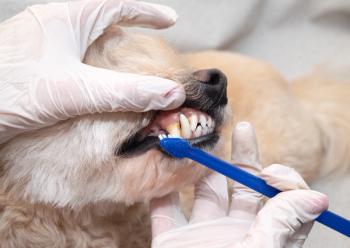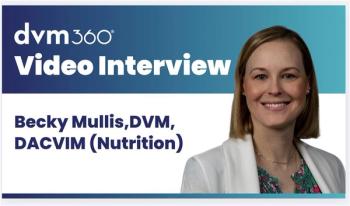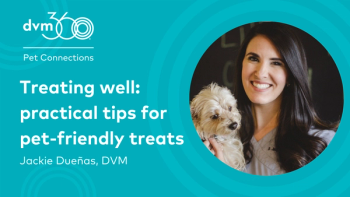
Dear Kara: Dental health (Sponsored by Hill's Pet Nutrition)
Kara answers questions about dental health
(PHOTO: RYAN KRAMER)
Is it necessary to begin talking about dental health in pets less than a year old? It seems like tartar doesn't begin forming in most dogs and cats until after their first year.
The healthcare team should discuss dental health in pets at every age. At six months, most puppies and kittens have their full adult dentition and should have an oral examination to check for any abnormalities or problems, such as retained deciduous teeth. Plaque and tartar have started to form and will continue to accumulate without proper periodontal therapy and homecare. Also, it is best to start training pets to accept oral hygiene at a young age. Handling the mouth, introducing a brushing device, and application of oral hygiene products should be part of routine puppy and kitten training. Preventing and treating periodontal disease is important to the pet's overall health and may affect the length and quality of a pet's life.
In healthy dogs and cats with mild dental tartar, do you recommend Hill's® Prescription Diet® t/d® Canine or Feline pet food in combination with brushing, or is it only recommended for more severe cases?
All your patients are at risk for periodontal disease! Don't wait until the disease is severe before you discuss the importance of effective, daily dental homecare. Hill's® Prescription Diet® t/d® Canine or Feline pet food is a great food for providing optimal nutrition and effective plaque and tartar control for adult and senior pets. Pets with grade 1 or higher periodontal disease should have appropriate professional periodontal care as determined by the veterinarian, and the healthcare team should work with the client to implement a homecare protocol. Effective homecare protocols must be tailored to each patient and client to support compliance. Tooth brushing is considered the gold standard, but owners may not have the manual dexterity or the time to implement an effective, consistent homecare brushing protocol. It is helpful to demonstrate brushing techniques. If daily tooth brushing does not fit into the client's lifestyle or ability, recommend another homecare protocol. Feeding t/d is a clinically effective, convenient, and efficient way for pets to obtain daily dental homecare.
Food for Thought
There are a number of products with dental claims and this seems to confuse owners. What can I tell clients who are looking for a product with a dental benefit?
Tell your clients about the Veterinary Oral Health Council (VOHC), a group established to provide an independent, objective, and credible way to recognize veterinary dental products that effectively control plaque and tartar. The VOHC system is recognized worldwide and is similar to the American Dental Association Seal of Acceptance system in human dentistry.
The VOHC reviews results of tests performed in accordance with approved protocols set by the council and awards a seal for control of plaque, tartar, or both plaque and tartar. It is important to look for the seal controlling plaque or both plaque and tartar, as plaque is the first step in developing periodontal disease. The first dental products to receive the VOHC Seal of Acceptance were the Hill's® Prescription Diet® t/d® Canine and Feline pet food formulas. For more information and a complete listing of products that have been awarded the VOHC Seal of Acceptance, visit
Does Hill's® Prescription Diet® t/d® Canine or Feline pet food provide any benefit to dogs that eat their food quickly, without much chewing?
To provide effective mechanical cleansing, dental food should promote chewing and maintain contact with the tooth surface. Hill's® Prescription Diet® t/d® Canine or Feline pet food provides mechanical cleansing of the tooth through the size and shape of the kibble and the specific fiber matrix. The larger kibble size encourages dogs and cats to chew and thus gain the benefit of the t/d fiber matrix. Some pets may eat very rapidly or appear to not chew their food. These pets may benefit from behavior modification techniques, such as using a divided tray (e.g., a cupcake tray) to encourage slower eating. It's important to assess the effectiveness of any homecare protocol and, if necessary, make modifications to ensure that the pet is receiving effective plaque control.
We have many owners who use Hill's® Prescription Diet® t/d® Canine or Feline pet food only as a treat and not as their pet's main nutrition source. Does this provide any dental benefit?
To deliver the maximum dental benefit and increase the feeding convenience for the pet owner, it is optimal to feed Hill's® Prescription Diet® t/d® Canine or Feline pet food as the full daily ration. In addition to the clinically proven dental benefits, t/d pet food delivers superior daily nutrition, the right balance of nutrients for adult pets, and a superior antioxidant formula. While there is some dental benefit to feeding t/d as 25% to 50% of a pet's daily ration, t/d has passed AAFCO feeding trials for adult maintenance and should be recommended by healthcare team members as the full daily ration.
Do you recommend sending home a bag of Hill's® Prescription Diet® t/d® Canine or Feline pet food after every dental cleaning? We are thinking of including this in our protocol.
Sending a bag of Hill's® Prescription Diet® t/d® home after periodontal therapy is a great addition to post-dental cleaning protocol and adds value to patient care. Some hospitals even include the price of a bag of t/d into the estimated cost of the procedure.
Some of our clients do not believe that their pet's dental health is a true health concern or that keeping their pet's teeth clean makes a difference to its health. What can we tell them?
Remind them that people typically visit the dentist every six months and brush their teeth twice a day. Ask your clients how they would feel if they went a day or two without brushing their teeth and then stretch that out to one, two, even six months! Sure, the immediate effects would be bad breath and 'sticky' teeth, but most clients can relate to the gum disease that would be present after just a few days of no oral hygiene. You can also reinforce the fact that plaque is primarily made up of bacteria that can spread into their pet's bloodstream, causing infection in other organs such as the heart or kidneys.
Talk to your clients about wellness and prevention and emphasize that oral health is essential for overall health and can affect their pet's appetite, mood, behavior, and even sensory perception. Visit
Kara M. Burns, MS, MEd, LVT
Kara M. Burns, MS, MEd, LVT Veterinary Technician Specialist Hill's Pet Nutrition
© 2009 Hill's Pet Nutrition, Inc. All rights reserved.®/TM Trademarks owned by Hill's Pet Nutrition, Inc. To view this and other issues of Dear Kara, visit
Newsletter
From exam room tips to practice management insights, get trusted veterinary news delivered straight to your inbox—subscribe to dvm360.






